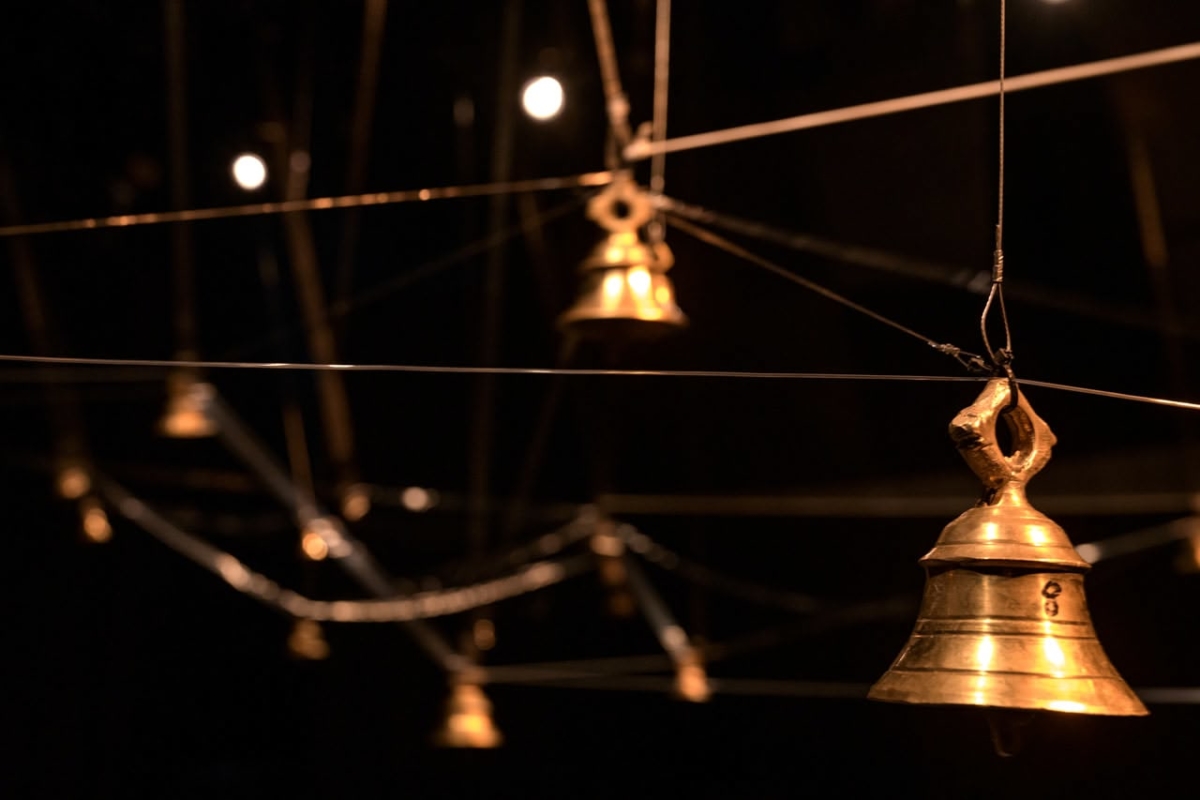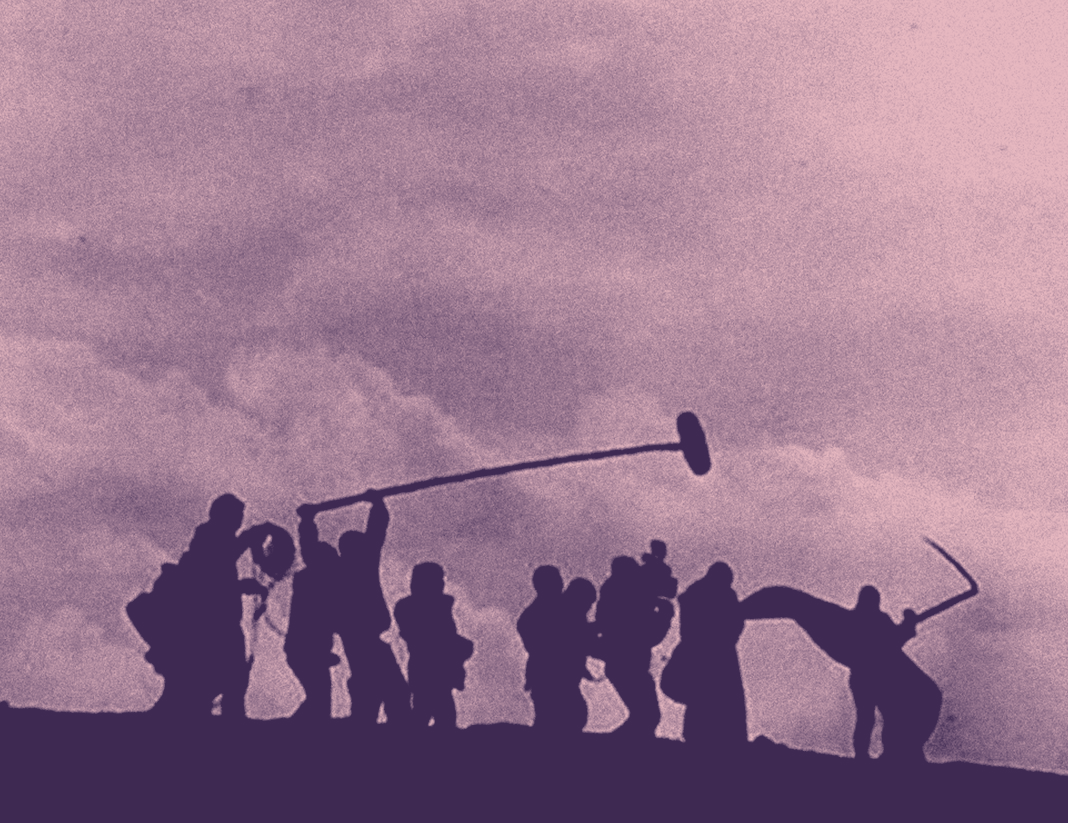
Tuesday, 29 April 2025, 18:30
Budhaditya Chattopadhyay and Stas Shärifullá in conversation on occasion of the conclusion of the project Critical Listening to the Global South: Towards a Decolonization of Sound Media.

Technologies (of capture) here are predominantly understood as a Western anthropogenic concept for facilitating linear progress, control and profit within a colonial-capitalist model. Technological modernity is celebrated as an outcome of European enlightenment and industrial revolution, and wartime innovations in electronics, such as transistors, resulting in technologies like sound recording, cinematography and photography, which are always thought to be travelling from Europe to the othered worlds, being received without resistance, and engineering the “civilizing” modernizations of “non-Western” societies and cultures. This view has been propagated within a colonial narrative of Europe’s superiority. Within this narrative, premodern concepts of technologies and tools, especially born outside of Europe, were not considered or recognized. However, technological innovations in the vast regions of the Global Souths in the wider fields of agriculture, disaster management, geoengineering, as well as cultural practices such as musical instrumentation, tuning and design, were as intricate and as sophisticated as their global counterparts. As argued (Chattopadhyay 2022), these premodern and precolonial technologies were more integrated and embedded in the natural systems, on material, temporal, spatial and logistic levels, and they were far from being extractive and were not focussed on quantifying knowledges for archiving and inscription.
Bridging this spatio-temporal divide in an artist-led gathering would not only help a trans-technological confluence, but also de-hegemonize Western-born technologies in today’s time perceived with post-globalising media cultures and a digital revolution since the 2000s that paved the way for a slowly democratizing planetary media field. The subversive artistic and scholarly interventions into the archaic technologies of capture and colonial archives, such as singing out the archives, hacking into the collection, performing out, re-recording, and repurposing the content, collectively enforce access and sharing in a community of listeners, may contribute to an ecology of co-sounding and co-listening to the ephemerality of sound, probing collectively into the phenomena of transcultural interactions, border crossings, and forms of trans-medial, and -technological confluences as resistance.
All times are CEST Basel time.
Find links to join on Zoom in the program below.
1:00 pm:
Intro with Budhaditya Chattopadhyay
1:05 – 1:50 pm:
Paola Torres Núñez del Prado
1:50 – 2:00 pm: Break (coffee/tea/water)
2:00 – 2:45 pm:
Moushumi Bhowmik
2:45 – 3:00 pm: Break (coffee/tea/water)
3:00 – 3:45 pm:
Ishita Chakraborty
3:45 – 4:00 pm: Break (coffee/tea/water)
4:00 – 5:00 pm:
Conversations, with Stas joining, engaging with the audience
Paola Torres Núñez del Prado (PE)
Paola Torres Núñez del Prado explores the boundaries and connections in between tactility, the visual and audio related to the human voice, to nature, and to synthetic ones whose listening is often considered less harmonious, such as machine or digital noises. Her work is essentially complex: she explores the limits of the senses, examining the concepts of interpretation, translation and misrepresentation, so as to reflect on mediated sensorial experiences while questioning the cultural hegemony within the history of Technology and the Arts. Her performances and her artworks, which are also part of the collections of Malmo Art Museum and the Public Art Agency of Sweden, have been presented in diverse countries of the Americas, Central Europe, and Scandinavia, where she is currently based.
Moushumi Bhowmik (IN/UK)
Moushumi Bhowmik is a singer, writer, collector of songs and sounds and practice-led researcher who works with field recordings and archival sounds. Whilst based in Kolkata, India, she travels and works in Bangladesh, India and the UK and Europe, collaborating with artists and scholars across disciplines. She runs an archive of field recordings from Bengal entitled The Travelling Archive (www.thetravellingarchive.org), which was launched in 2011. Engaged in critical and slow listening to silence and sound in colonial archives, Moushumi has a PhD from the School of Cultural Texts and Records, Jadavpur University, Kolkata, for her work on the wax cylinder recordings of Arnold Bake and the politics of archiving. Her critical essays have been included in anthologies and journals published by Palgrave Macmillan, Errant Bodies Press, Bloomsbury, Archive Books, The Sociological Review, The Sociological Review and others. Moushumi has taken part in several conferences, exhibitions and workshops including In the Field 2 at the London College of Communication in 2024, the Dystopia Sound Art Festival in Berlin in 2024 and Serendipity Art Festival in Goa in 2024. She is currently preparing her first monograph based on her doctoral dissertation, likely to be published by Jadavpur University Press in 2026. Meanwhile, she is working on an exhibition at Experimenter, Kolkata and publication from Jadavpur University Press, Kolkata, based on her archival practice.
Ishita Chakraborty (IN/CH)
Ishita Chakraborty (b. 1989) is an artist born in West Bengal, India, and who lives and works between Switzerland and India. Chakraborty’s artistic practice entails drawings, installations, poetry, sculpture, and sound. Her works address the issues connected to the climate crisis through an interconnected social justice lens. She investigates the strategies and the discourse of resistance narrated by individuals—often the subalterns. Their contexts are marked by the traces of displacement, the trauma of colonialism, their articulation in language, and identity. Chakraborty is represented by Gallery Espace, New Delhi, India. She has received her MFA degrees from Zurich University of the Arts, CH and Rabindra Bharati University, India. She taught Fine Arts as an assistant professor at Amity University, Kolkata (2016-2018). Her recent and forthcoming exhibitions include the Manor Art Prize solo exhibition at Aargauer Kunsthaus (2025), APROPOS HODLER at Kunsthaus Zürich, Switzerland (2024), Seeds and Souls at Kunsthalle Charlottenborg, Copenhagen, Denmark (2023), Sleeping in the Bed of Salt (solo) at Gallery Espace, New Delhi, India (2023), In Other Words (solo) at Vitrine Gallery, Basel, Switzerland (2023), The Scent of Rice (solo) at Kulturfolger, Zurich, Switzerland (2023), 8 Weiertal Biennale, Switzerland (2023), Stranger in the Village at Aargauer Kunsthaus, Switzerland (2023), Serendipity Art Festival Goa, India (2023), and The Mouth Is For Speaking at WE ARE AIA, Zurich (2022). Chakraborty has received numerous grants and awards, including the Manor Prize, Aargau (2024), a nomination for the Prix Mobiliere, Switzerland (2024), the Pro Helvetia Residency in Brazil in Amazonas (2024), and the Visiting Artist Fellowship at Lakshmi Mittal South Asia Institute, Harvard University (2020-2021). https://www.ishitachakraborty.com/
Organised by
Budhaditya Chattopadhyay (IN/NL/NO)
Budhaditya Chattopadhyay is a media artist, researcher, and writer. Chattopadhyay produces works for large-scale installations and live performance addressing contemporary issues of environment and ecology, migration, race, and decoloniality. His works have been widely exhibited, performed, or presented across the globe in numerous festivals, conferences and at well known venues. Chattopadhyay has an expansive body of scholarly publications in artistic research, media theory and aesthetics in leading peer-reviewed journals. He is the author of five books: The Nomadic Listener (2020), The Auditory Setting (2021), Between the Headphones (2021), Sound Practices in the Global South (2022) and Sound in Indian Film and Audiovisual Media: History, Practices, and Production (2023). Chattopadhyay holds a PhD in Artistic Research and Sound Studies from the Academy of Creative and Performing Arts, Leiden University, and is a Postdoctoral Fellow at KMD Bergen. https://budhaditya.org/
Also joining in the conversation
Stas Shärifullá (CH)
Stas Shärifullá, also known as HMOT, is an artist-researcher based in Basel, working with sound and decoloniality. Born and raised in East Siberia, Russia, with Başqort (Bashqort) roots, Stas takes this dual heritage as a starting point to study the politics of indigeneity, reflecting on both personal and global perspectives. Exploring a variety of sonic and listening practices, both indigenous and non-indigenous, Stas is focused on how their interactions enable the transformation of political imagination into direct action, and vice versa, examining the process that turns these practices into tools for community-building and the preservation of collective memory. As a self-taught computer musician and quraysı, Stas designs live performances around the idea of how musical traditions mutate and evolve when approached by someone with a remote, second hand perspective. Stas is currently an Associate Researcher at Critical Media Lab in Basel, a Gastdozent at the Institute Art Gender Nature HGK FHNW (Basel) and Sound Studies and Sonic Arts UdK (Berlin), and is pursuing a doctoral degree at the Department of Media Studies at the University of Basel. Stas’ works have been showcased at numerous international venues and events, including Manifesta 10, Volksbühne (Berlin), Jan Van Eyck Academie, Fondation Beyeler, CTM Festival, Transmediale, Kaserne Basel, Rhythmic Music Conservatory (Copenhagen), Kunsthalle Basel, Rote Fabrik (Zürich), Berghain (Berlin), MaerzMusik Festival, Biennale for Sound and Listening (Struer), Unsound Festival (Kazan), Copernicus Science Centre (Warsaw), Aram Khachaturian Concert Hall (Yerevan), Ausstellungsraum Klingental, addressing identity-based oppression, forced migration and resource extractivism.